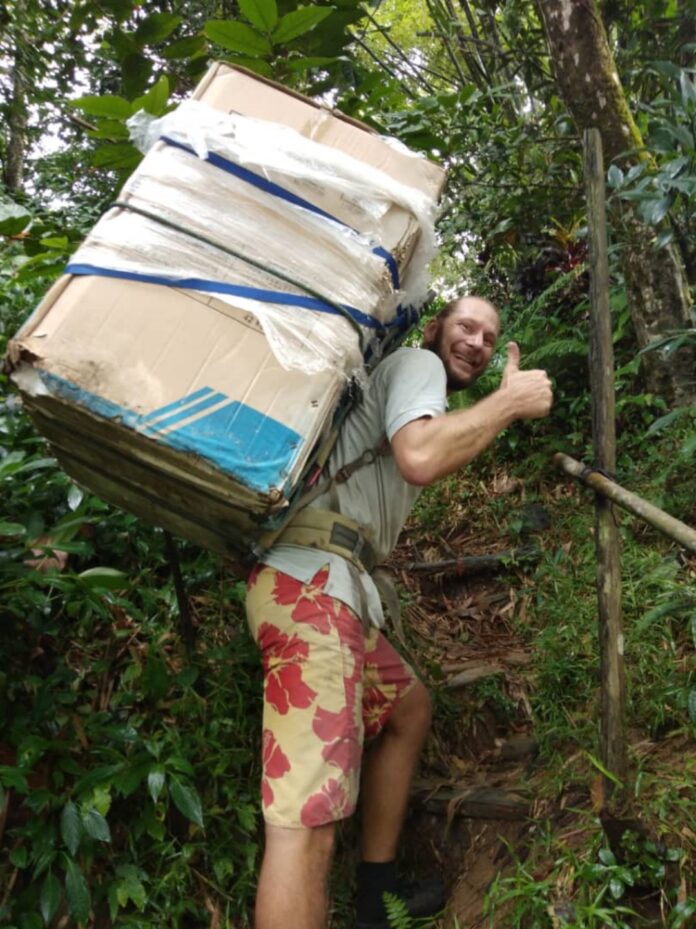Larsen carrying a freezer to his KuraKura homestay. – Photo by Robert Kenneth
KUCHING (Aug 19): The upper part of the Sarawak Kiri River that flows through Padawan before emptying its waters into the Sarawak River at the waterfront here has never been cleaner.
Known locally as Sungai Semadang, the river was where household garbage and even old furniture and electrical items were dumped indiscriminately by the local communities living along the riverbank.
Nature lover Lars Larsen, 45, who is from Norway, took it upon himself to clean up the river after he and his Bidayuh wife Liza Ahgau, 46, moved from Oslo to Liza’s home village of Kampung Semadang in Padawan in 2007.
The couple, who have two children Froya, 11 and Fiona, six, own and operate the eco-friendly KuraKura Homestay located near Semadang Village, which is just a 50-minute drive from the state capital.
The wooden homestay, nestled within a virgin rainforest in the hills of Borneo highlands, is situated on the banks of Sungai Semadang and has four rooms for guests to stay.
Larsen, who is an ex-serviceman, said while working in Norway he and his wife had saved enough money to build their homestay.
“My father-in-law and wife’s two uncles and I constructed the whole homestay in two years and we had our first few guests in March 2009,” he told Bernama, adding that their place became popular fast as it was one of the first few homestays to be established in a jungle setting just outside Kuching.
Larsen on his boat heading to his homestay. – Photo by Robert Kenneth
Environmental issue
With Sungai Semadang providing the only access to his homestay – to get there, it is a 25-minute trip upstream by boat from Kampung Semadang – Larsen was appalled at the sight of rubbish floating on the river and strewn all over the riverbank.
“I noticed the garbage while going up and down the river for two years when we were constructing the homestay. It was a pretty bad sight back then and I’ve seen chairs, washing machines, gas burners and all sorts of plastic bags being dumped into the river,” he said.
Cleaning up the river was a daunting task but since it had to be done Larsen undertook the cleaning operation himself. He would set out on his boat and pull out whatever trash he could get his hands on, sometimes with the help of his homestay guests who volunteered their services.
“We managed to remove most of the big stuff from the river but sometimes a few items show up on the riverbank after the rainy season,” he said.
However, he lamented, there seems to be an endless “supply” of plastic bags and bottles in the river so “even now I’m cleaning it by removing whatever plastic materials I see”.
Volunteer Pascal Bieri from Switzerland helping to collect rubbish from the Semadang River. – Photo by Robert Kenneth
Inspiration
Larsen’s efforts have not gone unnoticed and, in fact, the local community is inspired by what he has done to improve the condition of their river.
“I am glad to observe that in the last three years, there has been a small shift in the attitude of the locals (towards the river) and they seem to be much more aware of (the harmful effects of) littering.
“However, there are still people throwing rubbish into the river so more work needs to be done,” he added.
Former headman of Kampung Semadang Samson Mangang commended Larsen’s efforts in cleaning up Sungai Semadang, saying that since the river is cleaner now, it has become a popular site for the implementation of the Tagang System, which was introduced by the Sarawak Agriculture Department in 2007.
The Tagang system is a method of controlled fishing to conserve aquatic species in certain parts of rivers located near villages and longhouses.
Meanwhile, the Regional Centre of Expertise (RCE) Kuching also included Semadang River in its 5Rs (Refuse, Reduce, Reuse, Recycle, Repurpose) campaign in 2019, which included a talk on river conservation that was held during the fifth Semadang International Tagang Festival.
RCE Kuching vice-chairperson Mukvinder Sandhu noted that Larsen, who is one of the key stakeholders of RCE Kuching, has been doing a good job by volunteering to minimise the impact of pollution and dumping of waste into Sungai Semadang. — Bernama


